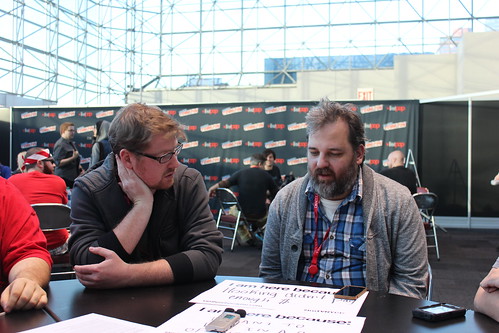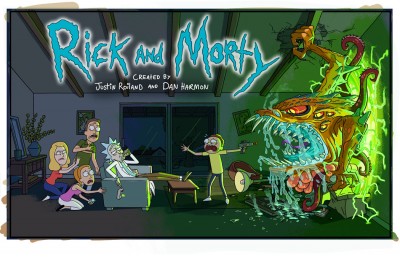
 |
|
| |||||||||||
|
Dan Harmon and Justin Roiland
Rick and Morty: Dan Harmon’s Next Experiment 
Q: What kind of show is Rick and Morty? Justin Roiland: I feel like...I don’t know. That’s a tough question. Dan Harmon: It’s an animated sitcom that’s about a family, but it has sci-fi elements as its backbone as well. It’s sort of like if you hate sci-fi...you might not hate this show, because it’s sci-fi that’s more grounded in the actual logic of the science. Sometimes that turns people off, because they’re like “I’m more into people than science.†Our sci-fi is more into sci-fi, than science. It’s more like, “OK, we know from sci-fi that it’s possible to travel between dimensions, it’s possible to travel through time or freeze time or teleport.†We use sci-fi as an excuse to do those tropes. And we are fascinated with that stuff, but above all it’s a family sit-com. Hopefully in the footsteps of The Simpsons a little bit. JR: Yeah. I know Family Guy will throw everything out for a joke, they’ll throw all the continuity and whatever out for a joke, but we’ve considered it important to keep the continuity and keep it grounded and keep our story really trackable. And we have leaned on the family element all across the season, while also still allowing ourselves to do crazy stories. The A story can be something to do with the mom and dad and the sister and the B story is Rick and Morty going to some bizarre dimension where there are chair people and giants. It’s crazy, but it’s really, really really trackable narrative. It’s like a Simpsons/Futurama thing, but if it was “Treehouse of Horror†every single week, maybe, and all that stuff really happened. If all that crazy “Treehouse of Horror†stuff was canon. But it does have that look, feel and timing, and it’s an incredible ambitious undertaking for the amount of time we’ve had, and the amount of scripts we’ve turned out. We’ve got people there working their asses off to get this stuff together in time. Q: How does this show differ from Community? DH: It’s such a different animal, You spend a certain amount of time on the script, which is about the same, then you divert paths, because you’re working toward an animatic with animation, while you’re actually prepping for production in live action. Live action goes a lot quicker ultimately, because once you’re done shooting...you’re shooting right away...then you can edit it and throw it on the air. Animation, even if you’re on an accelerated schedule, you’d still be way behind. 
JR: It’s a little more forgiving in animation. There are several checkpoints you have, that allow you to assess what you’ve written and look at it, and kind of think about it and fix it if it needs to be fixed. You can rewrite jokes, re-break story if that’s what it needs. I think to a certain extent they have that on Community, but it’s a much more accelerated pace. With Rick and Morty, we’ll write a script and turn it in, we’ll go record the voices, we’ll cut the radio play, we have the opportunity there to make changes. Then we deliver that to the board guys, and then it’s just us waiting for them to give us our thumbs. In which case, we have all this time to forget and kind of see it with fresh eyes again at thumb. Again we can make fixes and changes. Q: Will any of the cast of Community be a part of Rick and Morty? DH: There will be a little bit of bleed over. I was off of Community when we were doing this first batch of Rick and Morty, but we did have a chance to get John Oliver in there to do the voice of a character. JR: Dr. Balloon. DH: It’s been kept largely separate, those worlds. JR: Not on purpose. I remember having a list of people I wanted to get. We had casting meetings. I don’t think [Harmon] was in any of those, but I had this list of people. I remember Jim Rash was on it, people from Community who were on my list, and then...I have the worst memory in the world. Somebody swiped the list, and it was like that was it. There were so many people on that list that I have subsequently remembered, and I was like “F**k! That would have been perfect!†But I lost my list! Jim Rash would have been great. There were multiple characters that he could have played. And you get into these meetings with a billion other things going on in production and it’s like like, who do we cast, and you’re just… Sometimes I’d have people for sure, and sometimes I didn’t know, and luckily we have a nice pool of really awesome go-to guys, like Tom Kenny, Maurice LaMarche, Rob Paulsen...really classic voice-over guys who are just super versatile and great and always available. And always fun to work with. Q: After your experience with network television, what’s it like working with [adult swim]? DH: It’s great. It’s more comfortable, because, of the amount of creative energy you’re putting into something, there’s less lost to the larger machine that has to go into making something for the network. There’s a society there, there’s ideally a larger audience, though that fact is changing by the day, but the machine is still set up as if there’s 25 million people watching, so there’s a lot of politics, a lot of structure that you’re within. You have a lot of bosses, going back and forth. Community, and this isn’t the case with all network shows, has a completely different studio from the network, so you double all that stuff. At [adult swim], literally the one executive that we talk to for notes is the one guy in Atlanta that runs the whole thing. JR: Who loves the show. DH: And who says, “OK, I read your script, and here is my response to reading your script.†Take it or leave it. So, it’s more of a relationship. You want to make that guy happy. He’s such a smart guy, and you want to teach him the lesson that when he has a thought, you’ll try to help him out, because otherwise the situation that’s played out with the larger industry will happen with him. Maybe he’ll go “They don’t listen to me, so I’m gonna make them do what I want.†JR: What’s funny about [[adult swim] executive Mike] Lazzo is that, there are so many times when we’re on a notes call and he’ll bring something up and Dan and I will look at each other silently acknowledging, “Oh s**t, that was a f*****g really good note.†He really does have really good insight, and he’s helped the show so many times, in a number of little ways. There are very few times where he’s given a note where we’re just like “What!? What?! No...you don’t get it!†He really does get the show and he’s just such a great guy, such a fan of well-written cartoons. It’s a blessing to work with him. And I’m not just saying that. I really do mean it. Honest to God. Q: Is there anything you’ve carried over from making Community to Rick and Morty? DH: A lot of story muscle. Just the instinct about A and B story stuff. On Community, I was the crazy guy, and I think even though Justin and I are both crazy, Justin’s job is to be the crazy guy on Rick and Morty. If I’m representing any side of the fence, it’s the same side. I’m the one who’s going, “OK, in order for this to feel like a story, it has to come around to a resolution.†And it’s fun to be able to change that hat and I’m able to do it because of the muscles I had to build to make 25 episodes of a network sitcom. JR: And he’s very accommodating to my craziness. “I want a giant testicle monster!†DH: I learned to collaborate over there. I went into network TV with what a lot of us fell into if we hadn’t been desensitized to it. I was a very non-collaborative writer and you can’t be non-collaborative in network TV. There’s no time for it. And I’ve had that beaten out of me in season two of Community when I really started working with guys like Chris McKenna and the whole staff that wants to help you. The whole idea of delegating and re-writing each other and stuff was very offensive to me in season one. So I can crack the whip and tell one of the four writers on Rick and Morty it’s OK, we’re writing this together. There is no your joke, my joke.
Archives
DVD Talk Interviews Star Wars and Marvel costumer Kelly Cercone
DVD Talk Interviews Director Andrew Bowler Anna and the Apocalypse Cast Interview DVD Talk Interviews Director Chris Weitz Compete Archives
Review Staff
| Newsletter Subscribe
| Join DVD Talk Forum
|
| |||||||||
| |||||||||||